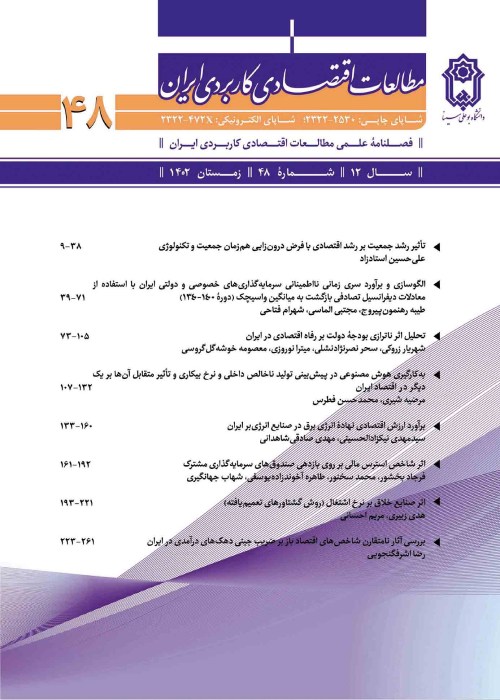Measuring Pro-poor Growth for Self-employment and Wage and Salary Earners, during Five Development Programs
Author(s):
Article Type:
Research/Original Article (دارای رتبه معتبر)
Abstract:
The main objective of this study is to measure Pro-poor Growthfor wage and salaries earners (in public, cooperative and private sectors) and self-employed jobs (agricultural and non-agricultural).The studies have mostly measured the Pro-poor Growthin rural and urban areas, but due to the different impacts of inflation on wage and salaries earners and self-employed jobs, the consequences of economic growth for these two groups of employees will be different.
To investigate this issue, Kakwani.et al. (2004) model and spending-income data of urban and rural households during five development programs (1989-2014) were used. The data of income for mentioned groups of jobs deflated by using the related price index. Considering that there are the jobs having wages and salaries and freelance jobs in both urban and rural areas, it is used from two urban and rural poverty lines that the related poverty line is calculated according to minimum basic requirements (Urshanskis method).
The findings show that in the first plan of development, the growth for wages and salaries earners has reduced poverty, but it has increased poverty in the freelance jobs. During the second plan of development, the growth in the jobs having wages and salaries and non-agricultural freelance jobs has reduced poverty, but it makes poverty (it is harmful) in the agricultural freelance jobs. In the third plan of development, the growth in the freelance jobs and jobs having wages and salaries (excluding the public sector) has reduced poverty and also in the fourth and fifth plans of development, the economic recession in all occupational groups(except cooperative sector of rural areas in the fourth plan) has worsen the situation of the poor. One of the questions raised in the paper is how the growth affects poverty in two occupational groups including jobs having wages and salaries and freelance jobs, the results show that growth in the different plans has various impacts on the reduction of poverty of jobs, such that in the first two plans of development, growth merely was in favor of jobs having wages and salaries and it is frequently seen in the public sector and it mostly makes poverty rather than it can eradicate poverty, but in the third plan(in contrast to the previous two plans) , growth in the public sector made poverty. The stagnation during fourth and fifth development programs was causing poverty for all occupational groups (except for cooperation paid people within rural areas during fourth development program).Therefore, although economic growth may not cause poverty reduction for all occupational groups, but stagnation will be certainly harmful for them in terms of poverty.
Based on the result, any increase of poverty in Iran is sometimes the result of growth and sometimes is the result of inequality. Therefore, it's suggested to continually follow distributional and development growth policies together. That's because exclusive attention toward redistribution-focused policies (like the fourth and fifth development programs) or growth-focused policies (like the first and the second development programs) will cause poverty to be attenuates in most of occupational categories. On the other hand, the results show that economic growth will have different impacts on different groups of employees. Consequently, in the evaluation of the performance of policies of social development and plans of development, it should be separately considered their impacts on different occupational groups. Accordingly, mere focus on the general indicators of growth, poverty and inequality and negligence to the situation of different employees in the developmental policies will mislead policymakers.
To investigate this issue, Kakwani.et al. (2004) model and spending-income data of urban and rural households during five development programs (1989-2014) were used. The data of income for mentioned groups of jobs deflated by using the related price index. Considering that there are the jobs having wages and salaries and freelance jobs in both urban and rural areas, it is used from two urban and rural poverty lines that the related poverty line is calculated according to minimum basic requirements (Urshanskis method).
The findings show that in the first plan of development, the growth for wages and salaries earners has reduced poverty, but it has increased poverty in the freelance jobs. During the second plan of development, the growth in the jobs having wages and salaries and non-agricultural freelance jobs has reduced poverty, but it makes poverty (it is harmful) in the agricultural freelance jobs. In the third plan of development, the growth in the freelance jobs and jobs having wages and salaries (excluding the public sector) has reduced poverty and also in the fourth and fifth plans of development, the economic recession in all occupational groups(except cooperative sector of rural areas in the fourth plan) has worsen the situation of the poor. One of the questions raised in the paper is how the growth affects poverty in two occupational groups including jobs having wages and salaries and freelance jobs, the results show that growth in the different plans has various impacts on the reduction of poverty of jobs, such that in the first two plans of development, growth merely was in favor of jobs having wages and salaries and it is frequently seen in the public sector and it mostly makes poverty rather than it can eradicate poverty, but in the third plan(in contrast to the previous two plans) , growth in the public sector made poverty. The stagnation during fourth and fifth development programs was causing poverty for all occupational groups (except for cooperation paid people within rural areas during fourth development program).Therefore, although economic growth may not cause poverty reduction for all occupational groups, but stagnation will be certainly harmful for them in terms of poverty.
Based on the result, any increase of poverty in Iran is sometimes the result of growth and sometimes is the result of inequality. Therefore, it's suggested to continually follow distributional and development growth policies together. That's because exclusive attention toward redistribution-focused policies (like the fourth and fifth development programs) or growth-focused policies (like the first and the second development programs) will cause poverty to be attenuates in most of occupational categories. On the other hand, the results show that economic growth will have different impacts on different groups of employees. Consequently, in the evaluation of the performance of policies of social development and plans of development, it should be separately considered their impacts on different occupational groups. Accordingly, mere focus on the general indicators of growth, poverty and inequality and negligence to the situation of different employees in the developmental policies will mislead policymakers.
Keywords:
Language:
Persian
Published:
Quarterly Journal of Applied Economics Studiesin Iran, Volume:6 Issue: 24, 2017
Pages:
177 to 198
magiran.com/p1776418
دانلود و مطالعه متن این مقاله با یکی از روشهای زیر امکان پذیر است:
اشتراک شخصی
با عضویت و پرداخت آنلاین حق اشتراک یکساله به مبلغ 1,390,000ريال میتوانید 70 عنوان مطلب دانلود کنید!
اشتراک سازمانی
به کتابخانه دانشگاه یا محل کار خود پیشنهاد کنید تا اشتراک سازمانی این پایگاه را برای دسترسی نامحدود همه کاربران به متن مطالب تهیه نمایند!
توجه!
- حق عضویت دریافتی صرف حمایت از نشریات عضو و نگهداری، تکمیل و توسعه مگیران میشود.
- پرداخت حق اشتراک و دانلود مقالات اجازه بازنشر آن در سایر رسانههای چاپی و دیجیتال را به کاربر نمیدهد.
In order to view content subscription is required
Personal subscription
Subscribe magiran.com for 70 € euros via PayPal and download 70 articles during a year.
Organization subscription
Please contact us to subscribe your university or library for unlimited access!



